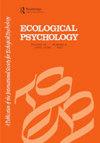“你看着一片海洋;我看到裂口,听到海浪,感觉到水流”:居住和熟练居民知识的增长
IF 1.8
3区 心理学
Q3 PSYCHOLOGY, EXPERIMENTAL
引用次数: 11
摘要
本研究探讨了一个理论问题,在体育科学等领域具有应用实际意义,涉及人们如何了解他们所居住的表演景观,以及他们所呈现的动态行动机会。在这里,我们提出人们如何认识他们的表演景观,以及他们如何学会与其中可用的启示相对应,是通过居住。更具体地说,通过居住,人们学会与表演景观的信息和启示的节奏产生共鸣,与它们纠缠在一起,成功地找到自己的方式,通过所承担的任务、问题和挑战。为了从理论上支持我们的分析,我们借鉴了詹姆斯·吉布森对知识的不同概念,以及蒂姆·英格戈尔德对技能的看法——通过编织各种关于熟练居民知识增长的民族志描述,为我们的讨论带来了实际的适用性。通过这些跨学科的见解,我们表明,正是通过提出问题、分享故事和跟踪调查,人们才能成长为他们所居住的地方的专业知识。本文章由计算机程序翻译,如有差异,请以英文原文为准。
“You Look at an Ocean; I See the Rips, Hear the Waves, and Feel the Currents”: Dwelling and the Growth of Enskiled Inhabitant Knowledge
Abstract This inquiry explores a theoretical question, of applied practical relevance in fields like sport science, relating to how people come to know the performance landscapes they inhabit, and the dynamic opportunities for action they present. Here, we propose that how people come to know their performance landscapes, and how they learn to correspond with available affordances in them, is through dwelling. More specifically, through dwelling, people learn to resonate with the rhythms of information and affordances of a performance landscape, entangling with them to successfully find their way through the tasks, problems and challenges taken up with. To theoretically support our analysis, we draw on James Gibson’s different conceptualisations of knowledge, and Tim Ingold’s perspectives of enskilment – bringing practical applicability to our discussion by weaving in various ethnographic accounts of the growth of enskiled inhabitant knowledge. Through these transdisciplinary insights, we show that it is by asking questions, sharing stories, and following up lines of inquiry that people grow into their enskiled knowledge of places they inhabit.
求助全文
通过发布文献求助,成功后即可免费获取论文全文。
去求助
来源期刊

Ecological Psychology
PSYCHOLOGY, EXPERIMENTAL-
CiteScore
3.30
自引率
10.50%
发文量
8
期刊介绍:
This unique journal publishes original articles that contribute to the understanding of psychological and behavioral processes as they occur within the ecological constraints of animal-environment systems. It focuses on problems of perception, action, cognition, communication, learning, development, and evolution in all species, to the extent that those problems derive from a consideration of whole animal-environment systems, rather than animals or their environments in isolation from each other. Significant contributions may come from such diverse fields as human experimental psychology, developmental/social psychology, animal behavior, human factors, fine arts, communication, computer science, philosophy, physical education and therapy, speech and hearing, and vision research.
 求助内容:
求助内容: 应助结果提醒方式:
应助结果提醒方式:


